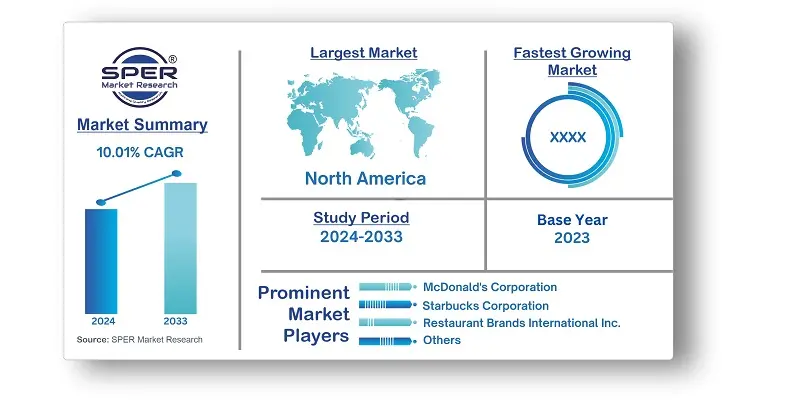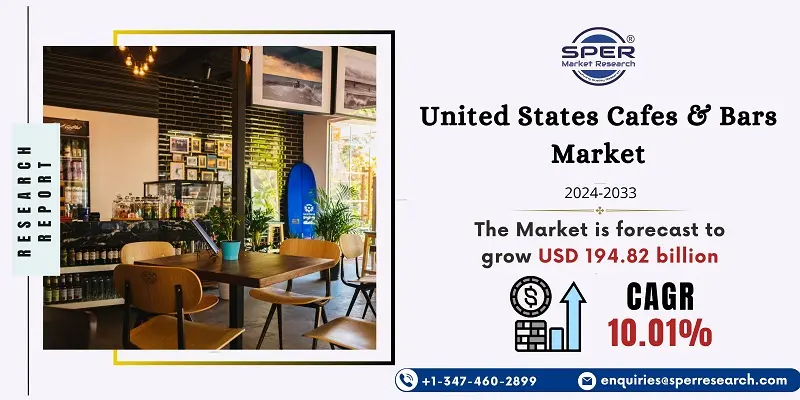
United States Cafes and Bars Market Trends, Share, Size, Demand, Revenue and Future Outlook
United States Cafes and Bars Market Growth, Size, Trends Analysis- By Cuisine, By Outlet, By Location- Regional Outlook, Competitive Strategies and Segment Forecast to 2033
| Published: Oct-2024 | Report ID: FOOD24110 | Pages: 1 - 106 | Formats*: |
| Category : Food & Beverages | |||
- Pret A Manger announced ambitions to expand in the United States in December 2022 through a franchise agreement with Dallas Holdings, a company that owns and operates restaurants. Through the agreement, Pret will open a network of new sites in Southern California and the Hudson Yards region of New York City.
- In January 2023, Dutch Bros. introduced White Chocolate Lavender, which is available as Dutch Freeze, breve, or cold brew in more than 650 locations.


| Report Metric | Details |
| Market size available for years | 2020-2033 |
| Base year considered | 2023 |
| Forecast period | 2024-2033 |
| Segments covered | By Cuisine, By Outlet, By Location. |
| Regions covered | Eastern Region, Western Region, Northern Region, Southern Region. |
| Companies Covered | Dutch Bros, Inc., Focus Brands LLC, Inspire Brands, Inc., International Dairy Queen, Inc., Jab Holding Company S.À.R.L., McDonald's Corporation, Restaurant Brands International Inc., Smoothie King Franchises Inc., Starbucks Corporation, Others. |
- Young Adults
- Professionals
- Families
- Students
- Health-Conscious Consumers
- Tourists and Travelers
- Affluent Consumers
| By Cuisine: | |
| By Outlet: | |
| By Location: |
- United States Cafes & Bars Market Size (FY’2024-FY’2033)
- Overview of United States Cafes & Bars Market
- Segmentation of United States Cafes & Bars Market By Cuisine (Bars & Pubs, Cafes, Juice/Smoothie/Desserts Bars, Specialist Coffee & Tea Shops)
- Segmentation of United States Cafes & Bars Market By Outlet (Chained Outlets, Independent Outlets)
- Segmentation of United States Cafes & Bars Market By Location (Leisure, Lodging, Retail, Standalone, Travel)
- Expansion Analysis of United States Cafes & Bars Market
- Problems and Obstacles in United States Cafes & Bars Market
- Competitive Landscape in the United States Cafes & Bars Market
- Impact of COVID-19 and Demonetization on United States Cafes & Bars Market
- Details on Current Investment in United States Cafes & Bars Market
- Competitive Analysis of United States Cafes & Bars Market
- Prominent Players in the United States Cafes & Bars Market
- SWOT Analysis of United States Cafes & Bars Market
- United States Cafes & Bars Market Future Outlook and Projections (FY’2024-FY’2033)
- Recommendations from Analyst
1.1. Scope of the report1.2. Market segment analysis
2.1. Research data source
2.1.1. Secondary Data2.1.2. Primary Data2.1.3. SPERs internal database2.1.4. Premium insight from KOLs
2.2. Market size estimation
2.2.1. Top-down and Bottom-up approach
2.3. Data triangulation
4.1. Driver, Restraint, Opportunity and Challenges analysis
4.1.1. Drivers4.1.2. Restraints4.1.3. Opportunities4.1.4. Challenges
4.2. COVID-19 Impacts of the United States Cafes & Bars Market
5.1. SWOT Analysis
5.1.1. Strengths5.1.2. Weaknesses5.1.3. Opportunities5.1.4. Threats
5.2. PESTEL Analysis
5.2.1. Political Landscape5.2.2. Economic Landscape5.2.3. Social Landscape5.2.4. Technological Landscape5.2.5. Environmental Landscape5.2.6. Legal Landscape
5.3. PORTERs Five Forces
5.3.1. Bargaining power of suppliers5.3.2. Bargaining power of buyers5.3.3. Threat of Substitute5.3.4. Threat of new entrant5.3.5. Competitive rivalry
5.4. Heat Map Analysis
6.1. United States Cafes & Bars Market Manufacturing Base Distribution, Sales Area, Product Type6.2. Mergers & Acquisitions, Partnerships, Product Launch, and Collaboration in United States Cafes & Bars Market
7.1. United States Cafes & Bars Market Size, Share and Forecast, By Cuisine, 2020-20267.2. United States Cafes & Bars Market Size, Share and Forecast, By Cuisine, 2027-20337.3. Bars & Pubs7.4. Cafes7.5. Juice/Smoothie/Desserts Bars7.6. Specialist Coffee & Tea Shops
8.1. United States Cafes & Bars Market Size, Share and Forecast, By Outlet, 2020-20268.2. United States Cafes & Bars Market Size, Share and Forecast, By Outlet, 2027-20338.3. Chained Outlets8.4. Independent Outlets
9.1. United States Cafes & Bars Market Size, Share and Forecast, By Location, 2020-20269.2. United States Cafes & Bars Market Size, Share and Forecast, By Location, 2027-20339.3. Leisure9.4. Lodging9.5. Retail9.6. Standalone9.7. Travel
10.1. United States Cafes & Bars Market Size and Market Share
11.1. United States Cafes & Bars Market Size and Market Share By Region (2020-2026)11.2. United States Cafes & Bars Market Size and Market Share By Region (2027-2033)11.3. Eastern Region11.4. Western Region11.5. Northern Region11.6. Southern Region
12.1. Dutch Bros, Inc.
12.1.1. Company details12.1.2. Financial outlook12.1.3. Product summary12.1.4. Recent developments
12.2. Focus Brands LLC
12.2.1. Company details12.2.2. Financial outlook12.2.3. Product summary12.2.4. Recent developments
12.3. Inspire Brands, Inc.
12.3.1. Company details12.3.2. Financial outlook12.3.3. Product summary12.3.4. Recent developments
12.4. International Dairy Queen, Inc.
12.4.1. Company details12.4.2. Financial outlook12.4.3. Product summary12.4.4. Recent developments
12.5. Jab Holding Company S.À.R.L.
12.5.1. Company details12.5.2. Financial outlook12.5.3. Product summary12.5.4. Recent developments
12.6. McDonald's Corporation
12.6.1. Company details12.6.2. Financial outlook12.6.3. Product summary12.6.4. Recent developments
12.7. Restaurant Brands International Inc.
12.7.1. Company details12.7.2. Financial outlook12.7.3. Product summary12.7.4. Recent developments
12.8. Smoothie King Franchises Inc.
12.8.1. Company details12.8.2. Financial outlook12.8.3. Product summary12.8.4. Recent developments
12.9. Starbucks Corporation
12.9.1. Company details12.9.2. Financial outlook12.9.3. Product summary12.9.4. Recent developments
12.10. Others
SPER Market Research’s methodology uses great emphasis on primary research to ensure that the market intelligence insights are up to date, reliable and accurate. Primary interviews are done with players involved in each phase of a supply chain to analyze the market forecasting. The secondary research method is used to help you fully understand how the future markets and the spending patterns look likes.
The report is based on in-depth qualitative and quantitative analysis of the Product Market. The quantitative analysis involves the application of various projection and sampling techniques. The qualitative analysis involves primary interviews, surveys, and vendor briefings. The data gathered as a result of these processes are validated through experts opinion. Our research methodology entails an ideal mixture of primary and secondary initiatives.



Frequently Asked Questions About This Report
PLACE AN ORDER
Year End Discount
Sample Report
Pre-Purchase Inquiry
NEED CUSTOMIZATION?
Request CustomizationCALL OR EMAIL US
100% Secure Payment






Related Reports
Our Global Clients
Our data-driven insights have influenced the strategy of 200+ reputed companies across the globe.




















